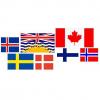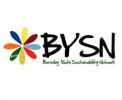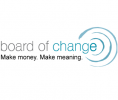News: The Human Factor I
The Human Factor I
And What About Us?
We have but little time. Natural systems are close to breakdowns, soon reaching tipping points of no return. This is true for the climate as well as for the ecosystems. There is a huge interest for these issues, especially with regard to questions of climate. However, the climate is not the only part of the system on which we need to focus. This is emphasized by scientists and other persons who see these systems as interrelated, as a whole.
There is one system, maybe the most important, that is neglected: the ‘system’ which causes the critical conditions of the other systems: the human system, the human factor. It seems that knowledge and understanding of the human aspect is uninteresting or unimportant. It is high time to deal with this, to ask ourselves questions dealing with why we destroy our own basis for living and how to turn this around. We need to ask who is responsible for the state of the world and who is responsible for changing it? Why do we talk so much about walking the talk, but do so little walking? And who should do the walking, and how? Questions dealing with leadership are essential. Undeniably many of today´s leaders have not been able to foresee the situation we are in now, and act accordingly. Instead they contributed to it. We cannot blame this on lack of knowledge. Nor by any means, do we believe that technology it itself will remedy the situation. Sara Parkin was quoted in ‘The State of the World 1992’, ‘Our numbness, our silence, our lack of outrage, could mean we end up the only species to have minutely monitored our own extinction. What a measly epitaph that would make: ‘they saw it coming but hadn´t the wit to stop it happening.
Words of wisdom, humanism, philosophy, psychology and religions all emphasize important qualities, qualities that are not so current today even though they are conditions for of a good life. We are all born with a number of basic affects, such as fear, anger, happiness and interest, which develop into more complex feelings. Access to all these are essential for a good life, with ourselves, other people as well as for our relationship with the world. Interest and commitment are important feelings when it comes to dealing with the challenges ahead. Psychological defences, like denial and repression, prevent, obstruct and prolong for us to make alterations ahead. Sandra Postel from World Watch Institute wrote in 1992 ‘Psychology as much as science will thus determine the planet´s fate, because action depends on overcoming denial, among the most paralyzing of human responses.’
We have fundamental human needs (Max-Neef), like participation, freedom, understanding and meaning. These are the same all over the world. When these are not satisfied they are replaced by compensatory ‘wants’, like ‘consumerism’, buying newer and bigger. Sustainable human values like gratitude, humility and humanity was described by S K Chakraborty. Zen Buddism speaks of the eight-parted path which includes wisdom, ethics and meditation. Self knowledge – gnoti seavton, know thyself – was an inscription on the temple of Apollo. Apollo was the god of the sun and the light, the god of music, science, poetry and art. Good self-knowledge includes good access to feelings and other qualities essential to increase our chances to save the world, and most of all, ourselves.
Much of this most of us can agree upon. But in real life they are given little time and thought. (Maybe the seven deadly sins – like greed, gluttony, arrogance and envy are more relevant?). All these aspects ask something of us as persons – time to learn about ourselves and embrace qualities, which might need courage, take responsibility and action.
To become and be more of a person is a lifelong process. Time is essential, time to grow and develop as a human being. After 27 years in prison Nelson Mandela said this in an interview 2001; ‘Before I went to jail, I was active in politics as a member of South Africa´s leading organization – and I was generally busy from seven am until midnight. I never had time to sit and think. As I worked, physical and mental fatigue set in and I was unable to operate to the maximum of my intellectual ability. But in a single cell in prison, I had time to think, I had a clear view of my past and present, and I found that my past left much to be desired, both in regard to my relations with other humans and in developing personal growth.’ Today Nelson Mandela is part of ‘The Elders’. This is one of their statements from their website, a quote from Desmond Tutu; ‘Despite all the ghastliness that is around, human beings are made for goodness. The ones who ought to be held in high regard are not the ones who are military powerful, nor even economically prosperous. They are the ones who have a commitment to try and make the world a better place. We – The Elders – will endeavor to support those people and do our best for humanity.’
It is seductive and easy to go with ‘economism’ and the ‘consumistic’ flow where so little is asked of us but to consume and do the superficial. To gain understanding of myself as well as for others demands time, time to reflect and to connect reason with feelings. To be part of a culture, take care of and develop it together with others is nothing for a ‘me first’- mentality.
What can be gained from taking the human aspect more seriously? A lot! Processes and changes can speed up when paralyzing feelings turn into ability to take action, resistance can turn into possibilities and visions can give goals to work towards. We need to use and take action according to the knowledge we have, knowledge about the state of the world as well as of ourselves as human beings. We will never know ‘everything’ as knowledge is constantly evolving. We do know enough, though, to know that we need to do all we can. Now. Sandra Postel again, ‘Extraordinary change is possible when enough courageous people grasp the need for it and become willing to act.’
Knowing and being aware does not necessarily lead to action. Helping us to act ‘right’ can sometimes be more efficient. Awareness can come as a ‘by-product’. ‘Grassroots’ are sometimes ahead of politicians and decision makers, and want more action and change and therefore can feel hampered by them. To use more public transportation it needs to be more attractive and easily available. To recycle the places for recycling have to be easily accessed. The less time and interest you have, the more important is the easy access.
Somewhere things might have been done already. It may be useful to look for good examples, which can also work as inspiration. When politicians and decision-makers say something is hard to do or impossible, showing that it might already work somewhere can have an effect on resistance and prestige.
Where are the world visions for a sustainable future? Visions for a sustainable and just world are needed. Visions that can contribute to focus on more constructive ways of relating and acting, visions on different levels – from small and local to national and international level. Visions can be powerful tools to move things ahead, to give inspiration and hope as well as psychologically important goals to give directions on where to go. For visions to be more realistic and give step by step indications ‘back-casting’ is needed.
We need concrete examples on what we can do, from the simple to the more complex, from eating more green stuff and lowering the indoor temperature to travel less and wiser and consume less. From not using plastic bags to rainwater harvesting.
Good leaders with visions, courage, ethics and are connected with reality and act accordingly exist, of course. In science as well as in politics, business and among grassroots. Leadership on all levels is needed, and it starts within us all. Oprah Winfrey said ‘Leadership is about empathy. It is about having the ability to relate and to connect with people for the purpose of inspiring and empowering their lives.’
We might just have a few years, to change, radically, in decisions as well as in action. ‘Earth has all the time in the world. We don´t’, said Chief Oren Lyons in the movie ‘The 11th Hour’. Let us see time as a possibility rather than a threat. It is our choice, our responsibility and our courage it depends on. It starts with each one of us, with you, with me.
Instead of ‘tipping points’ we can be part of the critical mass that is needed for turning development in a more positive direction. If we choose. If we take responsibility. If we have the courage. And it starts with the person, you and me.
“Where it goes depends on individuals” (C S “Buzz” Holling, father of the resilience theory, Wisdom seminars, Stockholm Resilience Centre, Nov. 21, 2007).
Ira Sundberg, MSc, eco-psychologist
Category:


































